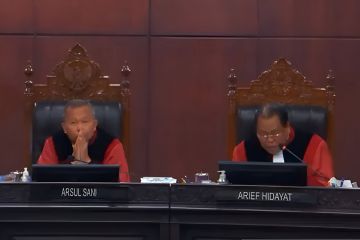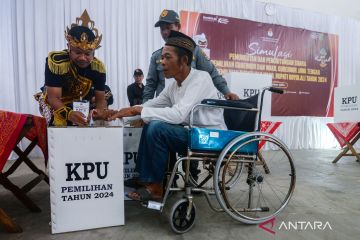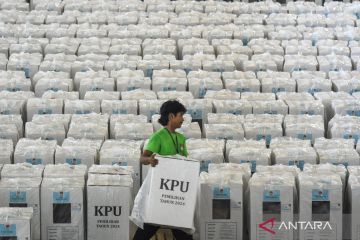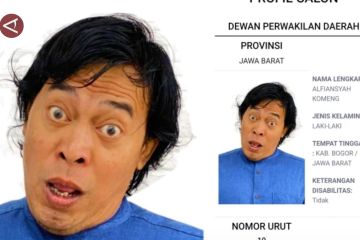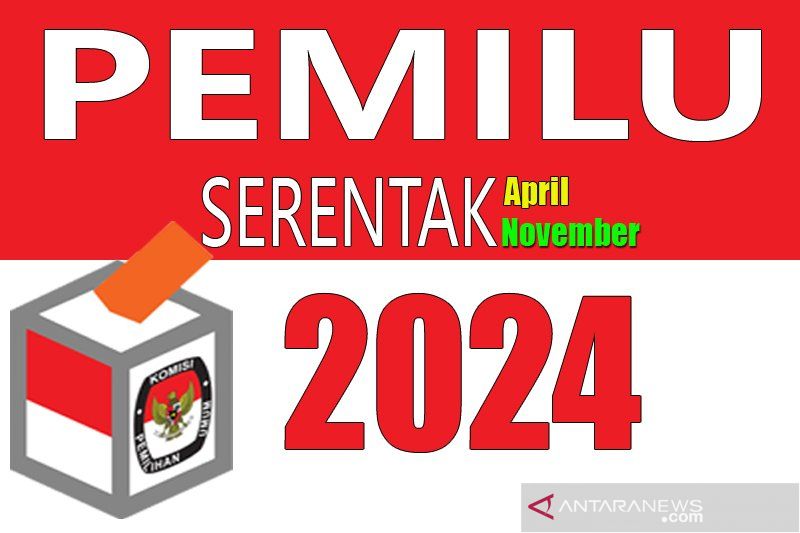
As Indonesia will hold the 2024 General Elections on February 14, 2024, efforts to support women's representation in politics are still needed.
The Global Gender Gap Index 2022 released by the World Economic Forum ranked Indonesia in the 92nd position out of 146 countries, with a score of 0.697.
For the Political Empowerment subindex, the score stood at 0.169, the country's lowest score as compared to the other three subindexes, namely Economic Participation and Opportunity, Health and Survival, and Educational Attainment.
The low representation of women in parliament is the most obvious example of the lack of women's political empowerment.
Currently, women's representation in the House of Representatives (DPR) has only reached 20.5 percent, still far from the affirmative target of 30 percent.
Member of the Supervisory Board of the Association for Elections and Democracy (Perludem) Titi Anggraini assessed that there are several potentials for increasing women's representation, among others, the general elections and regional elections, which will be held in 2024. The two open bigger opportunities for women to secure positions in politics.
Moreover, the number of female voters is big since more than 50 percent of the voters are females.
In addition, the increase in electoral regions and seats for the DPR, Regional Representatives Council (DPD), and Regional Legislative Councils (DPRD) at the provincial, city, and district levels offer opportunities for women.
The developments of information technology and social media have also opened access to alternative campaigns that are easier and cheaper.
Related news: Ministry urges women to get involved in politics
Women in politics
Nevertheless, several challenges exist regarding the election of women, such as Regulation of the General Elections Commission (KPU) Number 10 of 2023 on the Nominations of Members of the DPR, Provincial DPRD, and District/City DPRD, which weakens the presence of women in politics.
Apart from that, discriminative social and cultural factors, as well as stigma, stereotypes, marginalization, double burden, and violence against women still exist.
On top of that, there is still a belief that men are more suitable for leadership roles than women.
In addition, the high cost of politics due to the complex and costly election system hinders women from taking part.
The presence of transactional politics, such as vote buying, and bribery during vote counting is also a threat that excludes women from the world of politics.
According to Anggraini, politics and election systems must be improved to create a clean and healthy competition ecosystem.
The affirmative policy for women's representation is still deemed a burden for political parties, causing the lack of sustainable cadre training, education, and political capacity building.
The KPU assessed that the challenge for women legislative candidates in the 2024 General Elections is the view of some people who hold patriarchal social and cultural values.
KPU member Betty Epsilon Idroos stated that the condition made people to ignore the political track record, intelligence, managerial capability, and leadership qualities of women candidates.
Apart from that, the challenge to women's electability is the tendency of political parties to place female legislative candidates at number 3 in the ballot order, as they strive to meet the rule of having one woman candidate out of three candidates.
In the open-list proportional system, women tend to be used to gain votes but are not expected to be elected.
Moreover, affirmative action for women's candidacy only provides access to encourage women's candidacy, while in the contest to get seats, there are still gaps in political strategies, access to information, and relationships with potential constituents.
The other challenge is that women's candidacy is dominantly still based on kinship factors.
Executive Director of the Center for Political Studies of the University of Indonesia Hurriyah emphasized the need to improve the quality of elections to improve women's representation in parliament.
Moreover, there is a need to improve voters' political literacy.
When those ideal conditions are realized, support for women politicians can increase.
She also criticized the paradigm of elections that are, so far, considered a "party of democracy."
When elections are called a "party of democracy," people are positioned as guests who attend the party, only enjoy the festivities and entertainment, eat the food, and then go home after the party ends.
Elections that are considered as a party can cause the campaigning process to be unequal. The public specifically pays attention to legislative candidates having the most number of and biggest banners.
As a result, the contest becomes unequal, and in this case, those who often become victims are women legislative candidates and politicians.
Ideally, the election is about how people's votes are collected to decide leadership at the national level, in which the process must be carried out with free and fair principles.
Related news: Need greater women's participation in political decision-making: DPR
Support women's representation
The Ministry of Women's Empowerment and Child Protection invited all elements of society to support women's representation in parliament by voting for women legislative candidates.
The ministry is carrying out digital campaigns to support the cause.
Assistant Deputy of Gender Mainstreaming for Politics and Law at the ministry, Iip Ilham Firman, stated that the campaign is an appeal to support women's representation in the hopes that during the remaining time of the political campaign period for the 2024 General Elections, the messages can be conveyed well.
His side emphasized the importance of increasing women's representation, both in terms of quantity and quality, so that women's needs can be represented and defined in the parliament in the form of policies that are responsive to women's needs.
The 2024 General Elections is a golden opportunity for people, especially women, to accelerate the achievement of the target of 30 percent women's representation in parliament.
Currently, women's representation in the DPR has only reached 20.5 percent, and in the 2020-2024 National Medium-Term Development Plan (RPJMN), the government is targeting women's representation in the DPR to reach 22.5 percent.
Indeed, achieving the 30 percent women's representation target is not easy. Gender inequality and patriarchal culture are obstacles to achieving the target.
It is essential for all parties involved in the general elections, including political parties, to maximize efforts to empower women in politics.
With more seats held by women in parliament, it is expected to support tackling the problems of women in Indonesia.
Related news: Observing women's representation in Indonesia's politics
The Global Gender Gap Index 2022 released by the World Economic Forum ranked Indonesia in the 92nd position out of 146 countries, with a score of 0.697.
For the Political Empowerment subindex, the score stood at 0.169, the country's lowest score as compared to the other three subindexes, namely Economic Participation and Opportunity, Health and Survival, and Educational Attainment.
The low representation of women in parliament is the most obvious example of the lack of women's political empowerment.
Currently, women's representation in the House of Representatives (DPR) has only reached 20.5 percent, still far from the affirmative target of 30 percent.
Member of the Supervisory Board of the Association for Elections and Democracy (Perludem) Titi Anggraini assessed that there are several potentials for increasing women's representation, among others, the general elections and regional elections, which will be held in 2024. The two open bigger opportunities for women to secure positions in politics.
Moreover, the number of female voters is big since more than 50 percent of the voters are females.
In addition, the increase in electoral regions and seats for the DPR, Regional Representatives Council (DPD), and Regional Legislative Councils (DPRD) at the provincial, city, and district levels offer opportunities for women.
The developments of information technology and social media have also opened access to alternative campaigns that are easier and cheaper.
Related news: Ministry urges women to get involved in politics
Women in politics
Nevertheless, several challenges exist regarding the election of women, such as Regulation of the General Elections Commission (KPU) Number 10 of 2023 on the Nominations of Members of the DPR, Provincial DPRD, and District/City DPRD, which weakens the presence of women in politics.
Apart from that, discriminative social and cultural factors, as well as stigma, stereotypes, marginalization, double burden, and violence against women still exist.
On top of that, there is still a belief that men are more suitable for leadership roles than women.
In addition, the high cost of politics due to the complex and costly election system hinders women from taking part.
The presence of transactional politics, such as vote buying, and bribery during vote counting is also a threat that excludes women from the world of politics.
According to Anggraini, politics and election systems must be improved to create a clean and healthy competition ecosystem.
The affirmative policy for women's representation is still deemed a burden for political parties, causing the lack of sustainable cadre training, education, and political capacity building.
The KPU assessed that the challenge for women legislative candidates in the 2024 General Elections is the view of some people who hold patriarchal social and cultural values.
KPU member Betty Epsilon Idroos stated that the condition made people to ignore the political track record, intelligence, managerial capability, and leadership qualities of women candidates.
Apart from that, the challenge to women's electability is the tendency of political parties to place female legislative candidates at number 3 in the ballot order, as they strive to meet the rule of having one woman candidate out of three candidates.
In the open-list proportional system, women tend to be used to gain votes but are not expected to be elected.
Moreover, affirmative action for women's candidacy only provides access to encourage women's candidacy, while in the contest to get seats, there are still gaps in political strategies, access to information, and relationships with potential constituents.
The other challenge is that women's candidacy is dominantly still based on kinship factors.
Executive Director of the Center for Political Studies of the University of Indonesia Hurriyah emphasized the need to improve the quality of elections to improve women's representation in parliament.
Moreover, there is a need to improve voters' political literacy.
When those ideal conditions are realized, support for women politicians can increase.
She also criticized the paradigm of elections that are, so far, considered a "party of democracy."
When elections are called a "party of democracy," people are positioned as guests who attend the party, only enjoy the festivities and entertainment, eat the food, and then go home after the party ends.
Elections that are considered as a party can cause the campaigning process to be unequal. The public specifically pays attention to legislative candidates having the most number of and biggest banners.
As a result, the contest becomes unequal, and in this case, those who often become victims are women legislative candidates and politicians.
Ideally, the election is about how people's votes are collected to decide leadership at the national level, in which the process must be carried out with free and fair principles.
Related news: Need greater women's participation in political decision-making: DPR
Support women's representation
The Ministry of Women's Empowerment and Child Protection invited all elements of society to support women's representation in parliament by voting for women legislative candidates.
The ministry is carrying out digital campaigns to support the cause.
Assistant Deputy of Gender Mainstreaming for Politics and Law at the ministry, Iip Ilham Firman, stated that the campaign is an appeal to support women's representation in the hopes that during the remaining time of the political campaign period for the 2024 General Elections, the messages can be conveyed well.
His side emphasized the importance of increasing women's representation, both in terms of quantity and quality, so that women's needs can be represented and defined in the parliament in the form of policies that are responsive to women's needs.
The 2024 General Elections is a golden opportunity for people, especially women, to accelerate the achievement of the target of 30 percent women's representation in parliament.
Currently, women's representation in the DPR has only reached 20.5 percent, and in the 2020-2024 National Medium-Term Development Plan (RPJMN), the government is targeting women's representation in the DPR to reach 22.5 percent.
Indeed, achieving the 30 percent women's representation target is not easy. Gender inequality and patriarchal culture are obstacles to achieving the target.
It is essential for all parties involved in the general elections, including political parties, to maximize efforts to empower women in politics.
With more seats held by women in parliament, it is expected to support tackling the problems of women in Indonesia.
Related news: Observing women's representation in Indonesia's politics
Reporter: KR-RA
Editor: Yuni Arisandy Sinaga
Copyright © ANTARA 2024
Editor: Yuni Arisandy Sinaga
Copyright © ANTARA 2024






